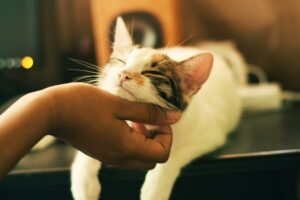Why is My Cat Meowing So Much? And Other Weird Noises
Why is My Cat Meowing So Much? And Other Weird Noises
Excessive vocalization is the technical term for why your cat is meowing so much. Cats communicate with each other and their people through meowing, while excessive vocalization is when they do it so much as to cause concern.
Excessive vocalization is usually a sign of attention seeking. The cat has learned that if they meow a lot they will get attention, such as when they are let out or fed. They usually stop once you give in and provide what they are seeking, whether that’s food, to open a door, or a cuddle.
Unfortunately, we can only outline the reasons your cat might be meowing so much. A veterinarian will be able to treat the underlying cause of discomfort so that your cat calms down.
What is normal vs excessive vocalization?
What constitutes normal vocalization for you and your cat depends on a few different factors. You could just have a chatty cat. If your cat has always meowed a lot or only does it in short, tolerable moments until a need is fulfilled, it could be perfectly normal. If there has been a significant change in your cat’s meowing habits and it’s suddenly vocalizing all the time, that could be a sign of a deeper issue.
Calling for help
Your cat could be noisy because of a health problem. They could be in pain or distress and obviously can’t tell their human what the issue is except by meowing. The excessive meowing could be due to their vision or hearing weakening. They could also be experiencing anxiety, frustration, aggression, or other emotional symptoms.

Photo by Tran Mau Tri Tam ✪ on Unsplash
Related: Understanding Cat Body Language
How to stop your cat meowing so much
If this outspoken demeanour is out of character for your furry friend, and they’re doing it for no reason—for example not standing by a closed door or empty food bowl—then you should take them to the vet. You want to find out if there’s something wrong with your cat early in order to treat it effectively. If the vet finds an underlying issue, they can treat the root cause and hopefully your cat will return to normal behaviour.
If the vet rules out a physical problem, you can either see a veterinary behaviourist or try nourishing your cat’s emotional needs first.
Many people choose cats over dogs as they are low-maintenance pets. You don’t have to walk them and they are good at coming to you for attention when they want a top up rather than needing constant companionship like dogs.
That said, cats still require love, attention, stimulation, and interaction to keep mentally and emotionally healthy.
Devote some time each day to spending with your cat. Groom them, play, even get them a new toy. It could be they were just meowing so much out of boredom. Give them some attention and they’ll have no need to moan at you.
When to ignore your cat’s excessive vocalization
Ignore your cat if the vet has given them the all clear and you give them plenty of attention already. Like people, it’s not beyond cats to crave more than a healthy dose of attention. If you think this is the case, ignore your cat’s noisy pleas for you to notice them and they will soon learn it doesn’t get results. Then they should stop.
Reward your cat for normal behaviour. Go and pet them when they’re sitting quietly. Give them a treat for silently brushing against you rather than when they meow.

Photo by Yerlin Matu on Unsplash
Why is my cat making weird noises?
Cats show their personalities through the noises they make. It can be normal for a cat to make weird noises such as meowing, purring, chirping, hissing, yapping, and growling. Cats are characters: if their noises match their feeling in a given situation, it’s normal.
Considering brushing your cat yourself if they frequently wheeze and cough up furballs.
They may make bizarre noises if you give them catnip. This is something of a happiness overload, and it’s up to you to determine if they seem to be enjoying it or overwhelmed.
Why is my cat meowing at night?
Other animals
You might hear your cat making strange low rumbles in the middle of the night if another cat has entered their space. If you have a cat flap, it’s not uncommon for other cats to come in and yours will growl, hiss, and meow at them to turn tail and leave.
If they’re making strange noises outdoors, they could be on the hunt or protecting their territory from an animal you can’t sense.
Dreaming
Some cats make weird noises when they dream: a mixture of meowing, purring, growling, and even exertion like heavy breathing and snuffling. Their bodies will react to whatever they dream about, so it’s probably nothing to worry about if your cat makes weird noises while sleeping.

Meow, that was a long tale. We hope you’ve found this helpful. We hope your noisy furball is just getting chatty and there’s no deeper issue, but as with all health advice, both human and animal, an article is no replacement for a licensed professional.
Banner image by Marlon Soares on Unsplash


Leave a comment